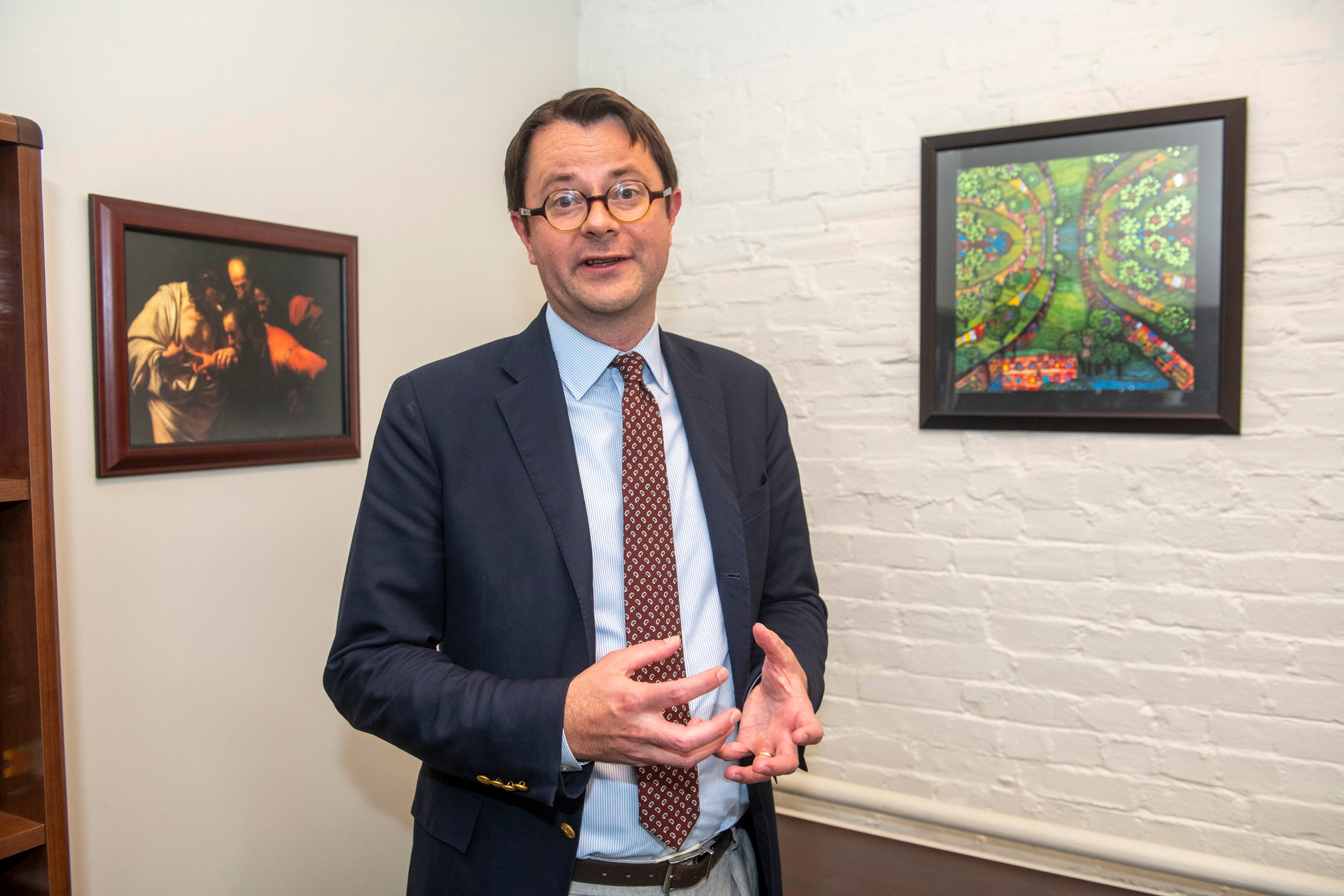
“It indicated that the enactment of these laws increased the incidence of suicide by about 5 percent. It’s a small percentage increase, but we’re a large country so that does translate into roughly 125 suicides per year,” says Tyler VanderWeele.
Kris Snibbe/Harvard Staff Photographer
Abortion law, suicide rate study adds to raging debate. But are we missing point?
Epidemiologist says research tends to be weaponized on both sides, overshadows mental health needs of those with unwanted pregnancies.
A study published in December showed a connection between restrictive abortion laws and increased suicides by pregnant women in the U.S. The research, conducted by University of Pennsylvania scientists, examined data between 1974 and 2016 and so didn’t consider changes since the U.S. Supreme Court struck down Roe v. Wade last year, but the dramatically heightened tensions around the issue prompted Tyler VanderWeele , the John L. Loeb and Frances Lehman Loeb Professor of Epidemiology at the Harvard T.H. Chan School of Public Health , to argue in a recent editorial in JAMA Psychiatry that the raging policy debate shouldn’t obscure what the research shows are very real mental health challenges for pregnant patients considering abortion, no matter what they decide. VanderWeele, who is also director of the Human Flourishing Program at the Harvard Institute for Quantitative Social Science, spoke with the Gazette on the topic.
Q&A
GAZETTE: Let’s talk about the study on abortion and suicide by Jonathan Zandberg out of the University of Pennsylvania. What findings do you think are important?
VANDERWEELE: The study was looking at laws restricting abortion access in states, how those changed over time, and from an analytic standpoint, what the mental health consequences might be. You can look at the timing of changes in the restrictions and the changes in mental health. It’s complicated because there are all sorts of trends taking place simultaneously, but when you’ve got all 50 states and 40 years of data, you can control for other variables and try to work out roughly what the effect of those laws might be. Any observational study where you don’t randomize is not definitive — and that’s the case with this one — but from a methodologic perspective, this was a pretty good design. It indicated that the enactment of these laws increased the incidence of suicide by about 5 percent. It’s a small percentage increase, but we’re a large country so that does translate into roughly 125 suicides per year. That’s a small fraction of total suicides, but from my perspective every life is important.
GAZETTE: And over 40 years, we’re talking about more than 5,000 suicides.
VANDERWEELE: And these are completed suicides, so this is indicating greater mental anguish, greater suicidal ideation than just the completed suicides. So there are real mental health difficulties and challenges around this issue, not necessarily for all women, but for many. There have been some studies on this indicating that restrictions on access for those who would like an abortion lead to mental health challenges — anxiety and stress — and then some literature that actually having an abortion leads to higher rates of depression and suicide ideation. It’s disputed and the quality of these studies isn’t great, but it’s quite plausible that both point to the need for better mental health care.
GAZETTE: Are you concerned that this will be used as a weapon in the political battle over abortion versus to highlight a mental health problem we need to address?
VANDERWEELE: I am not an expert on this topic — my primary interaction with it has been through the research literature — but my sense is that, to some extent in the reporting of the research and to a large extent in the media uptake, these various associations have been used by both sides to weaponize the research to advocate for either pro-life or pro-choice policies.
That’s problematic in two respects. First, I don’t think this is where the center of the debate lies. I think what’s taking place is, on the pro-choice side, there are concerns about women’s autonomy, control, and privacy. And on the pro-life side, there’s a belief that a fetus is a human life and that this is the intentional destruction of human life and so is wrong. This is fundamentally a moral — and at some level metaphysical — debate: When does life begin? I think the intractable nature of the political debate is because there are very different views on those issues. So to then say, “We’re going to make this decision according to mental health statistics,” is to ignore the fundamental contours of the debate and, to some extent, to stop trying to understand the other side’s perspective and engage with it. Certainly, there are limitations with regard to policies that reasonably take both sides into account, but I’m not sure we’ve exhaustively explored all that might be possible. In some ways then, weaponizing the research shifts the debate to someplace where it ought not be.
The second problematic aspect is it’s moving the empirical research away from the mental health care needs of women who are confronting what are often very difficult situations, regardless of the decision they make. Having an unwanted pregnancy is difficult and is often accompanied by other challenging circumstances with regard to financial state, relationships, and work/life complications. The abortion and mental health research should thus be focused on the very real needs of mental health care for women.
GAZETTE: Are there particular populations that are most affected by this?
VANDERWEELE: There is evidence that Black women and lower socioeconomic status women have higher rates of abortion and more difficulties accessing mental health care. They’re particularly affected by the neglect that results from focusing reproductive health, abortion, and mental health research around policy questions rather than the needs of women.
All of these studies give us averages that compare groups of women with unwanted pregnancies who are facing different laws or making different decisions but who are already facing challenges, with higher mental health struggles. Both groups need help trying to navigate these difficult situations, regardless of policies around the abortion question. And individual women’s experiences are going to be different than the average. There are going to be individuals in both groups who really need mental health care. So a reorientation of the mental health, abortion, abortion access literature toward what are the mental health care needs and how might they be met would be advantageous for everyone. I do think that is something that both sides of the political debate could approach together: How do we provide for the mental health needs of women?
GAZETTE: What kinds of things could be done to help that aren’t?
VANDERWEELE: One might divide this into the policy level and the research and clinical level. At the policy level, these difficulties are arising in large part because of the number of unwanted pregnancies. There has been reasonably good work on the reasons for that, ranging from the absence of a stable partner, to serious financial constraints, to concerns about care for existing children, to lack of autonomy, and other things. We could put in place better parental leave policies in this country, which don’t compare favorably with other developed countries. That of course wouldn’t address all of these cases where the pregnancy is unwanted, but it would help.
I think more work — this is some of the work of the Human Flourishing Program — could be devoted to supporting and promoting better relationships. Social well-being is embedded in the World Health Organization’s definition of health as a state of complete physical, mental, and social well-being. Yet it’s only very recently that the World Health Organization launched an initiative on social well-being. We do know some things about how to support relationships and there’s increasingly evidence-based interventions around what leads to greater marital stability. Again, it’s only a piece of the puzzle, but I think an important one.
On the research front, as I said in the commentary, we can move away from these comparisons toward understanding mental health care needs. Under what circumstances are depression, anxiety, and suicide most likely to arise and when, during the process of reproductive care, are they most likely to arise? On the clinical side, screening for mental health challenges as well as talking about the mother’s life circumstances and financial constraints and concerns about child care and so on could help.
The bigger debate touches on lots of other issues, but with respect to mental health we could be doing better on policy, we could be doing better on research, we could be doing better on clinical care in ways that are partially overlooked because of the orientation of the research toward the abortion access question rather than mental health care.


